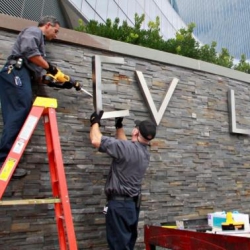The state of New Jersey has given Atlantic City a short-term loan of $40 million. The loan keeps the troubled gambling destination from borrowing money in the capital markets this year.
The loan situation is just the latest in a series of bad news items for the credit rating of the Boardwalk. The loan was offered to keep Atlantic City from getting into the kind of debt spiral that is often reserved for consumers with a bad credit history. Meanwhile, the lack of progress in stemming budget deficits have caused Moody’s Investment Service to suggest it could lower Atlantic City’s bond rating into the “junk” category.
Must Repay Loan by March 31
According to a loan agreement signed on December 18 by Atlantic City Mayor Don Guardian and state officials, the city needs to repay the loan by March 31 at an interest rate of 0.75%.
The loan was precipitated when a bond issuance expected to raise $140 million was postponed. Atlantic City leaders hoped to scale back the issuance into the $40 million range before the end of the year, but this too was cancelled, due to concerns about the city’s long term economic viability. The city expects to issue $140 million in bonds in the first quarter of 2015, says Revenue Director Michael Stinson.
Tax Lien Auction Did Not Go Well
The city next tried to sell tax lien debt on two of the city’s casinos: $22 million for Trump Plaza and $31 million for Revel Casino. Atlantic City had hoped to net about $50 million by auctioning off the debt, but only received one bidder. This ended up netting about $20 million on the Trump property, though the more lucrative debt on Revel Casino received no bid.
Atlantic City had faced a $70 million tax deficit it needed to make good. The city depends for about 70% of its revenues on casino taxes and fees, but the loss of 4 of 12 casinos in 2014 has severely curtailed tax revenues coming from those businesses. The tax base was further eroded by those four closings, due to the 8,000 lost jobs in the casino industry.
Trump Taj Mahal Further Clouds Picture
At present, a fifth casino is going through the bankruptcy process: Trump Taj Mahal. Emergency measures have been discussed in the past few weeks to keep that casino operating, along with its 3,000 employees.
Carl Icahn’s Loan and Takeover
Last week, Carl Icahn agreed to loan Trump Taj Mahal $20 million to keep it operating into the new year. Icahn owns over $250 million of debt to the casino, so he is stemming the tide in hopes of retrieving his investment.
Icahn has been bargaining with Trump Entertainment Resorts to take control of the casino, but he is mired in negotiations with the casino’s workers over a financial plan to keep the doors open. The plan would take away the workers’ health and pension benefits, so it has met with staunch criticism and resistance. Carl Icahn also wanted Mayor Don Guardian to offer him tax breaks, but Guardian said such tax breaks simply were not possible.
Why the Loan Was Needed
The loan from New Jersey was needed, because Atlantic City is having a hard time borrowing from the capital markets at a low rate. Concerns about the city’s long term viability remain, causing the credit rating organizations to reevaluate Atlantic City’s interest rates several times over the past year or so.
In fact, Moody’s Investors Service to warn earlier in December that it could downgrade the city’s “Ba1” credit rating, already considered low, into the junk credit territory. Mayor Guardian says the three-month loan by the state should help his city get its financing better situated, while also resolving the fate of Trump Taj Mahal. Under those circumstances, he believes the city’s credit rating will look better by the end of March 2015.
New Jersey has attempted several measures to boost Atlantic City’s moribund casino economy. The main reason online gambling was embraced was to give Atlantic City casinos a revenue boost. The experiment has been disappointing, though. The city next tried to help the gaming industry by legalizing sports gambling, but that resulted in a series of lawsuits by the American sports associations, which cost the state millions of dollars in legal fees and confirmed that sports betting was illegal. The state is also looking into online skill games as a solution, but implementation and marketing for such gaming might cost millions more.

